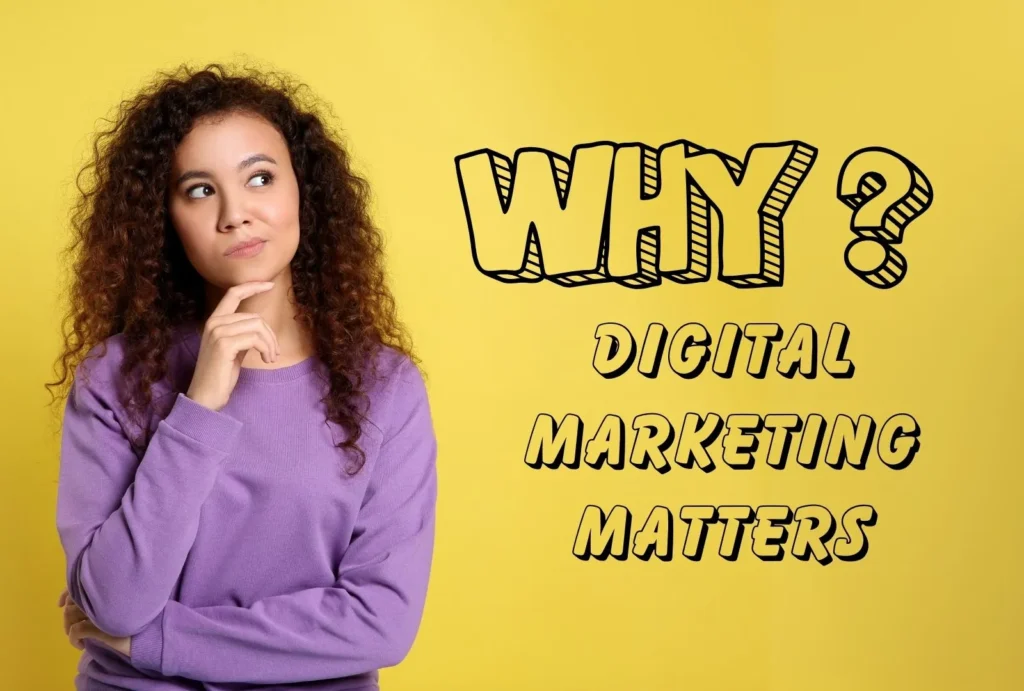In the digital age, businesses can’t afford to ignore the importance of digital marketing. It’s no longer just an option, but a necessity for survival and growth.
Digital marketing offers a way to reach a wider audience, more cost-effectively and measurably. It allows businesses to target specific demographics, interests, and locations, making marketing efforts more efficient and effective.
The importance of SEO in digital marketing is also undeniable. It improves visibility on search engines, leading to increased organic traffic and potential customers.
Moreover, digital marketing benefits businesses by providing higher conversion rates and improved customer engagement. It offers detailed analytics and insights into customer behavior, helping businesses make informed decisions.
This article will delve into why digital marketing matters for businesses. It will explore its role in achieving marketing effectiveness, the benefits it offers, and the importance of SEO within the digital marketing strategy.
Understanding Digital Marketing and Its Scope
Digital marketing encompasses a wide range of online channels and strategies. It involves promoting products or services using the internet and digital tools.
The scope of digital marketing is vast and includes SEO, content marketing, social media, email, and more. Each channel serves a different purpose, but together they form a comprehensive strategy.
Search engines are often a starting point for digital marketing. Businesses optimize their online content to appear prominently in search results. This boosts visibility and drives organic traffic.
Social media platforms play a crucial role in engaging with potential and existing customers. They are ideal for building brand awareness and fostering community interaction.
Email marketing remains pivotal for nurturing relationships with prospects. It is also effective in maintaining customer loyalty through personalized communication. Overall, digital marketing is a multifaceted strategy essential for modern businesses looking to thrive in the current economy.
The Digital Marketing Importance in Today’s Economy
In today’s economy, digital marketing plays an indispensable role. It allows businesses to reach customers more effectively than traditional methods. With the internet’s widespread reach, it’s become a cornerstone of marketing strategies.
Cost-effectiveness is a significant factor driving the shift to digital. Traditional advertising often comes with high costs and limited impact. Digital marketing provides more affordable options with greater potential reach.
Furthermore, digital marketing offers incredible measurement capabilities. Businesses can track engagement, conversion rates, and the effectiveness of campaigns in real-time. This data-driven approach facilitates better decision-making.
Digital marketing is crucial in this competitive landscape. It levels the playing field, allowing small businesses to compete with larger enterprises. With the right strategies, even a small company can significantly impact.
The importance of digital marketing grows as consumer habits continue evolving. More people rely on online resources for information and shopping. Embracing digital marketing helps businesses stay relevant and thrive.
Reaching a Wider Audience Cost-Effectively
Digital marketing is a game-changer in reaching broader audiences. Unlike traditional methods, it allows for expansive reach without substantial cost. Businesses can target local, national, and even global markets.
Online platforms have vast user bases. This means businesses can connect with people who might never encounter their products otherwise. With relatively low investment, digital campaigns can attract significant attention.
Moreover, cost-effective strategies ensure a better return on investment. Without going over budget, businesses can accomplish their marketing objectives. This efficiency is vital in today’s competitive and budget-conscious business world.
Enhanced Targeting and Personalization
Digital marketing excels in its ability to target and personalize. Companies might focus on particular groups, hobbies, and habits. This precision ensures that marketing messages reach the right audience effectively.
Personalization enhances the customer experience significantly. Tailored messages resonate more deeply, fostering stronger connections. Consumers are more inclined to interact with material that appeals to their interests.
Additionally, personalization can boost conversion rates. By delivering the right message at the right time, businesses increase the chance of customer action. This targeted approach is invaluable in optimizing marketing efforts.
Importance of SEO in Digital Marketing
SEO, or search engine optimization, is foundational to digital marketing. It focuses on enhancing a website’s visibility in search engine results pages. Higher visibility often leads to more organic traffic and potential sales.
SEO involves multiple strategies and activities. Here are some key elements:
- Keyword Research: Identifying words and phrases that potential customers use in searches.
- On-Page Optimization: Improving website content and structure to be more search-friendly.
- Quality Backlinks: Building links from reputable sites to increase authority.
SEO is crucial because it offers long-term benefits. Unlike paid advertising, SEO can continue driving traffic over time with regular updates. This makes it a sustainable component of any digital marketing strategy.
Moreover, improving search rankings translates to increased credibility. Customers trust search engines to deliver the most relevant results. By appearing at the top, businesses can gain consumer trust and authority in their market.
Digital Marketing Benefits for Businesses
Digital marketing offers numerous benefits that traditional methods can struggle to match. One of the most significant is the ability to reach audiences on multiple channels seamlessly. Businesses can interact with customers via social media, email, and more, ensuring consistent engagement.
Another benefit is cost efficiency. Digital marketing campaigns can be tailored to fit any budget. This flexibility allows even small businesses to compete effectively.
Moreover, digital marketing provides unparalleled audience insights. Marketers can track user interactions, preferences, and behaviors. This data is invaluable for refining strategies and improving results.
Customer relationships benefit greatly from digital marketing. Engaging directly with audiences builds trust and loyalty. Interaction often leads to better customer experiences and retention.
Lastly, the ability to experiment and adapt is a major advantage. Businesses can test various strategies and quickly pivot if something isn’t working. This agility is critical in the fast-paced digital age.
Higher Conversion Rates and Improved Customer Engagement
Digital marketing shines in its ability to convert potential customers into buyers. Advanced targeting ensures messaging reaches the most interested audiences. Tailoring content to specific needs and desires boosts conversion rates.
Additionally, digital platforms foster exceptional customer engagement. Social media and emails allow for two-way communication. Businesses can respond to inquiries and feedback in real-time.
Engagement encourages loyalty and repeat business. Customers feel more connected to brands that interact personally. This relationship-building is key to long-term success.
Measurable Results and Analytics
One standout feature of digital marketing is measurability. Unlike traditional marketing, digital efforts can be tracked precisely. Metrics such as clicks, views, and conversions provide clear insights.
Analytics tools help marketers understand what strategies work. Data can be used to optimize campaigns for better performance. This leads to more effective and efficient marketing efforts.
Measurable results also ensure accountability. Businesses can see a direct correlation between spending and outcomes. This transparency is essential for making informed decisions about future marketing initiatives.
Flexibility and Adaptability in Marketing Strategies
Digital marketing’s flexibility is one of its greatest strengths. Campaigns can be adjusted on the fly based on performance data. This allows businesses to respond quickly to changing market conditions.
Adaptability ensures that marketing strategies remain relevant. As consumer trends shift, businesses can pivot their approach. This agility is critical in staying ahead in a rapidly evolving environment.
Additionally, digital marketing supports diverse campaign types. Whether through social media, content marketing, or PPC, businesses can experiment across various channels. This variety enhances engagement and broadens reach.
Marketing Effectiveness: How Digital Marketing Delivers
Digital marketing stands out for its exceptional marketing effectiveness. One key factor is its ability to target specific audiences with precision. By focusing on interested consumers, businesses can enhance their impact and reduce wasted efforts.
Moreover, digital marketing offers a higher return on investment (ROI). Compared to traditional media, digital channels often require less budget while delivering greater results. This efficiency makes it an attractive option for businesses.
Another important aspect is the immediate feedback loop it provides. Real-time data helps businesses understand consumer responses quickly. Adjustments can be made swiftly to maintain campaign effectiveness.
Finally, the ability to test various strategies and content ensures that digital marketing remains relevant. Constant optimization is possible thanks to detailed analytics. This adaptability allows businesses to refine their approach continually.
Real-Time Customer Service and Feedback
One of digital marketing’s strengths is facilitating real-time customer service. Consumers can reach out with questions or concerns instantly. This immediacy builds trust and satisfaction.
Prompt feedback is equally valuable for businesses. Quick reactions allow companies to address issues before they escalate. This minimizes potential negative impacts on brand reputation.
Additionally, real-time interactions contribute to a positive customer experience. When businesses engage promptly, customer loyalty often increases. Satisfied customers are more likely to become brand advocates, boosting word-of-mouth marketing.
Scalability for All Business Sizes
Digital marketing is uniquely scalable, making it ideal for businesses of any size. Startups with limited budgets can utilize cost-effective digital strategies. At the same time, large enterprises can launch extensive campaigns with ease.
This scalability ensures that all businesses can reap benefits. Smaller companies can compete with larger rivals by focusing on niche audiences. Digital tools level the playing field, allowing everyone to participate in the digital market.
Moreover, scaling operations is straightforward as businesses grow. Digital platforms provide the flexibility to expand campaigns incrementally. This adaptability is crucial for maintaining momentum as market conditions change.
Leveraging Digital Marketing for Competitive Advantage
In today’s competitive market, digital marketing offers a distinct edge. Its capacity for quick adaptation ensures that businesses can stay nimble. Adjusting strategies based on data allows for maintaining relevance and competitiveness.
Additionally, digital marketing tools provide invaluable insights. Businesses can analyze customer behavior, preferences, and trends. This data-driven approach enables strategic decisions that align with consumer expectations.
Furthermore, digital marketing fosters innovation in outreach methods. Interactive content and personalized campaigns capture attention effectively. As a result, businesses can engage more meaningfully with audiences than through traditional means.
Ultimately, embracing digital marketing’s advantages translates to growth opportunities. Businesses that harness these tools position themselves strategically for success. This proactive approach ensures they remain competitive regardless of industry changes.
Staying Ahead in a Rapidly Evolving Digital Landscape
The digital landscape is in constant flux. Keeping pace with these changes is crucial for staying relevant. Businesses must be proactive in adopting new digital trends.
Moreover, technology offers new tools and platforms regularly. Utilizing these innovations can help businesses stand out. Remaining flexible and open to change is key to leveraging these opportunities.
Finally, staying informed helps businesses anticipate shifts. Monitoring industry trends allows for timely strategic updates. This vigilance ensures a business’s ability to remain ahead of competitors.
Leveling the Playing Field for Small Businesses
Digital marketing provides small businesses with unique opportunities. It levels the playing field, allowing them to compete with larger companies. Cost-effective tools enable focused targeting without a hefty budget.
Moreover, niche marketing strategies can be highly effective. Small businesses can carve out areas of expertise. This specialization attracts customers seeking specific solutions, fostering loyalty.
Additionally, digital marketing supports brand visibility. Small businesses can achieve significant reach using strategic campaigns. Online presence allows them to challenge larger competitors with agility and creativity.
Conclusion: Embracing the Digital Marketing Revolution
The digital marketing revolution is transforming business landscapes globally. Its dynamic nature offers unmatched opportunities to engage audiences effectively. Businesses must adapt to leverage these advantages fully.
Moreover, the multitude of digital tools enhances strategic outreach. From SEO to social media, the possibilities are vast. Effective use of these tools ensures sustained growth and competitiveness.
Finally, embracing digital marketing fosters innovation and responsiveness. Businesses that adopt these strategies are better positioned for future challenges. The shift to digital is not just beneficial; it is essential for long-term success.






